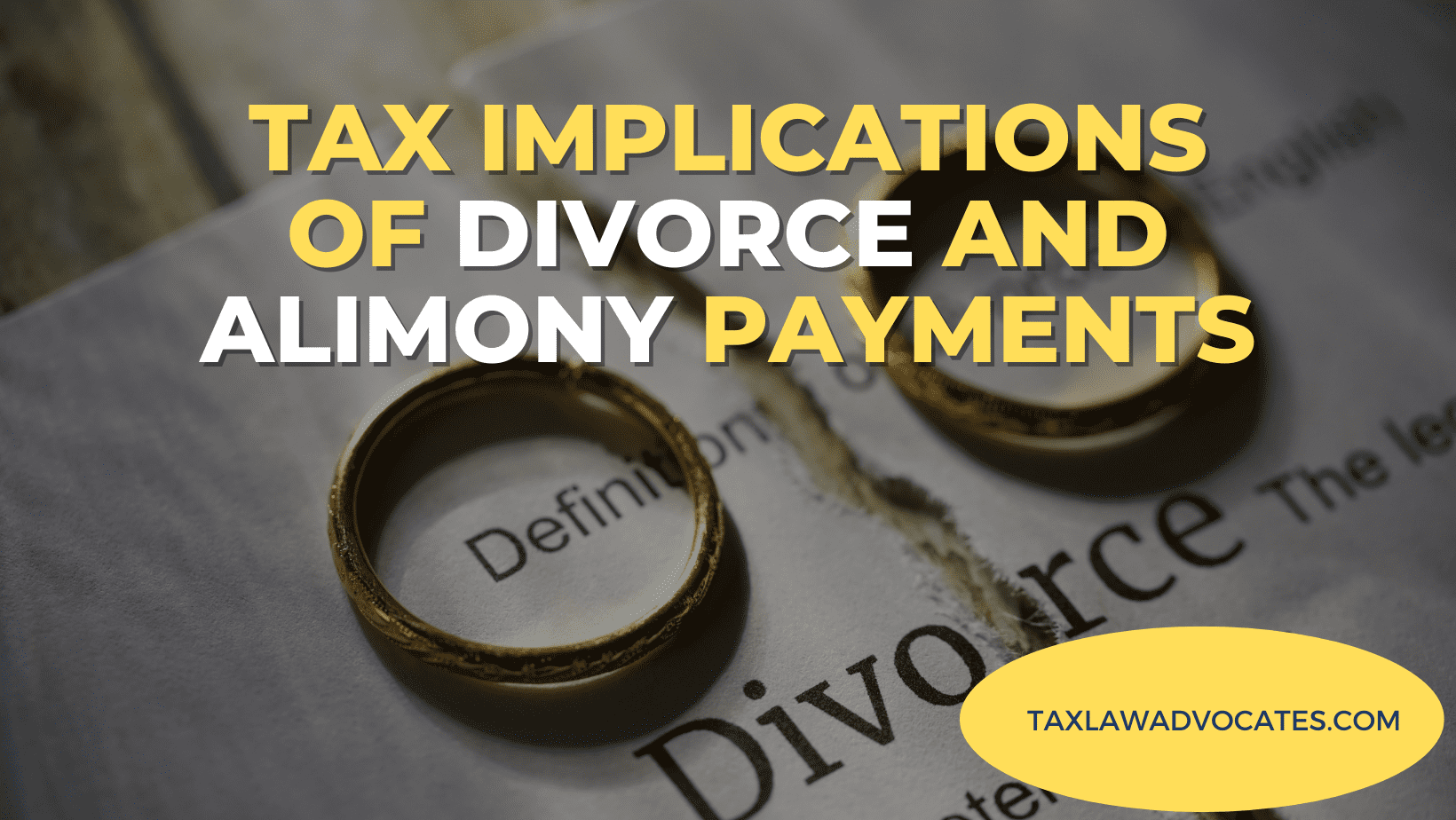Divorce brings significant changes to various aspects of life, including your financial and tax situations. Understanding the tax implications of divorce, particularly regarding alimony payments and property settlements, is crucial for navigating this challenging period. Recent tax reforms have further complicated these matters, making it essential for divorcing couples to stay informed. Tax Law Advocates is here to help you understand these changes and provide guidance to minimize the financial impact of your divorce. For personalized assistance, contact Tax Law Advocates at 855-612-7777.
The Changing Landscape of Alimony Taxation
Alimony Taxation Before and After the TCJA
The Tax Cuts and Jobs Act of 2017 (TCJA) brought significant changes to the taxation of alimony. For divorce or separation agreements finalized before January 1, 2019, alimony payments were tax-deductible for the payer and taxable income for the recipient. This provided a financial benefit to the payer, who could reduce their taxable income, while the recipient had to report the payments as income.
However, for agreements finalized on or after January 1, 2019, the TCJA eliminated these provisions. Now, alimony payments are neither deductible by the payer nor taxable for the recipient. This shift has fundamentally altered the financial dynamics of divorce settlements. Couples negotiating alimony must consider the entire financial impact without relying on tax deductions.
Modifications to Pre-2019 Agreements
The TCJA also affects modifications to divorce agreements signed before January 1, 2019. If a pre-2019 agreement is modified to explicitly state that the new TCJA rules apply, the new rules will govern the tax treatment of alimony payments. Without such a modification, the old rules (deductible for the payer and taxable for the recipient) continue to apply. It’s crucial to carefully consider the tax implications before modifying any existing agreements.
IRS Definition of Alimony Payments
To qualify as alimony or separate maintenance, payments must meet specific criteria set by the IRS:
- You do not file a joint tax return with your former spouse.
- Payments are made in cash, by check, or by money order.
- Payments are made to or for a spouse or former spouse under a divorce or legal separation agreement.
- Legally separated spouses cannot be part of the same household when making payments.
- Liability for the payment does not extend beyond the death of the spouse receiving the payments.
- The payment is not child support or a property settlement.
Payments not meeting these criteria, such as child support or non-cash property settlements, do not qualify as alimony for tax purposes.
Reporting Alimony on Your Tax Return
For divorce agreements finalized before January 1, 2019, alimony must be reported on your federal tax return:
– Recipients: Enter the amount received on Form 1040, Schedule 1, line 2a. You must also provide the payer’s Social Security number.
– Payers: Enter the amount paid on Form 1040, Schedule 1, line 18a. Include the recipient’s Social Security number to avoid penalties.
For agreements dated January 1, 2019, or later, there is no need to report alimony payments on your federal tax return since they are not considered income or deductible.
Property Settlements and Tax Implications
Property settlements during a divorce typically do not result in immediate taxable events. However, future tax consequences can arise based on the assets received. For instance, if you receive appreciated assets like stocks, you will be responsible for capital gains taxes on the entire appreciation when you sell them, not just the gains accrued post-divorce.
Choosing Assets Wisely
Selecting assets in a divorce settlement requires careful consideration of potential tax liabilities. Opting for cash or assets with minimal appreciation can help minimize future tax burdens. It’s advisable to consult with tax professionals to understand the tax implications fully and make informed decisions.
Claiming Dependents
Determining which parent claims the children as dependents can impact tax benefits. Generally, the custodial parent—the one with whom the child lives for the majority of the year—claims the dependent. However, the non-custodial parent can claim the dependent if specific criteria are met, including:
- The parents are divorced, legally separated, or living apart.
- The child received over half of their support from the parents.
- The child is in the custody of one or both parents for more than half the year.
- The custodial parent signs Form 8332, releasing the claim to the non-custodial parent.
Non-custodial parents claiming dependents should be aware that certain tax benefits, such as head of household status and the child and dependent care credit, are reserved for custodial parents.
Minimizing Financial Impact
Plan Your Divorce Settlement
Engaging in strategic planning during your divorce can help mitigate tax consequences. Work with your attorney and tax professionals to structure your settlement in a tax-efficient manner. This includes considering the tax implications of alimony, property settlements, and dependent claims.
Stay Informed on State Tax Laws
State income tax laws can vary significantly, affecting how divorce-related payments are treated. Consult with local tax professionals or refer to your state’s taxation authority to understand the state-specific tax impacts of your divorce.
Seek Professional Guidance
Navigating the tax implications of divorce requires expertise. Tax Law Advocates is here to assist you in understanding and managing these complex issues. Our experienced team can provide personalized guidance to help you make informed decisions and minimize the financial impact of your divorce. Contact Tax Law Advocates if you have questions about the IRS Fresh Start Program, IRS Debt Forgiveness Program or any other tax resolution services.
Divorce brings significant tax considerations, particularly regarding alimony payments and property settlements. Recent tax reforms have changed how these aspects are treated, making it essential for divorcing couples to stay informed and plan strategically. Tax Law Advocates is dedicated to helping you navigate these complexities and minimize the financial impact of your divorce.






